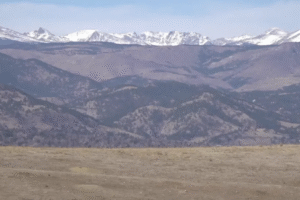Chasing the High
A Jackson Hole resident battles his addiction
- Published In: Other News & Features
- Last Updated: Nov 14, 2023

By Alec Klein
Special to the Wyoming Truth
Editor’s Note: This story is part of an ongoing series about the impact of the lack of inpatient rehabilitation treatment centers in Jackson Hole. It discusses alcoholism, drug addiction and suicide. Reader discretion is advised.
Meet Sven Getter. It’s not his real name, but a nickname—and who he aspires to be.
The imaginary Sven likes to snowboard, ski and ride a bike. In his mind’s eye, Sven is apt to meditate or go for hikes. Sven is the kind of guy who unwinds by sitting by a lake or river.
The creation of Sven is what happens when, “You don’t want to be this addict anymore,” said the 31-year-old resident of Jackson Hole about his own travails with substance use.
You invent a name—a persona—to pour your thoughts and dreams into. You tell yourself that you’re not defined by the alcohol addiction. You are not the drink. “You want to be something different,” he said. “It’s who I am when I’m not feeling bad or low or majorly depressed.”
Sven isn’t really one person. He is all different kinds of people, a multiplicity of personalities and charisma—all wrapped into one. Now, he chases after Sven. He seeks to embody him. Because Sven is a superhero. He can do all things.
“What do I tell Sven to do? I want to live my life,” he said. “I want to live my life like someone else.”
This is the story of a young man in recovery in Jackson Hole—a story told, in part, as he passed over the mountains, driving where the reception is spotty but the beauty is constant. But it’s not the whole story, not nearly. He still has so much more of his story to write. This is just a glimpse into the formation of an addiction, how it took hold and clawed its way into one person’s life until he was effectively pulverized—and sought a way forward.
It’s also a story of particular relevance because Jackson Hole is a place where it’s hard to get help if you’re struggling with an addiction. Despite its cornucopia of wealth, the state’s no. 1 resort attraction has no inpatient rehab services. Some say the problem is it’s too expensive. Others say, the Jackson community can well afford the price tag of an inpatient rehab center—but chooses not to place it in their backyard.
Bad for business.

But the toll is undeniable. In Jackson Hole, a higher percentage of adults reports binge or excessive drinking than that of the state or nation, according to a countrywide report issued by the University of Wisconsin Population Health Institute earlier this year. Over 20% — about one in five people in Teton County, home to the city of Jackson — reported excessive drinking. What’s more, 18% of motor vehicle crash deaths in Teton County involved alcohol.
The trouble with alcohol is that it doesn’t merely afflict the wealthy, or the tourists for which Jackson is famous; alcoholism also goes after the region’s substantial service sector workforce, ranch hands and immigrants. And the problem isn’t confined to Jackson Hole: Wyoming owns one of the highest per capita rates of alcohol-related deaths.
It is, of course, a national problem, too. But alcohol has taken a backseat in much of the news media to another devastating addiction—that of opioids, like fentanyl. And perhaps for good reason: Nearly 110,000 people died last year in the United States as a result of drug overdose deaths — most from synthetic opioids — according to the Centers for Disease Control and Prevention. Border control officials said they are waging a constant battle against major drug cartels that are smuggling the lethal drug over the southern border between the United States and Mexico.
Still, alcohol is even deadlier. In an average year, about 140,000 people in the United States die due to the use of alcohol. One in 10 Americans over the age of 12 suffers from alcohol use disorder, according to the National Center for Drug Abuse Statistics.
How can alcohol take root among such young children?
The high
Born and raised in the Chicago suburbs, he was the oldest of three boys in an archetypal American home. His mom was a homemaker; his dad was a broker-dealer in the finance industry and a hall of famer college football player back in the day. He was reared in the Catholic Church where, he said, “God and football were the real deal.” From day 1, he was groomed to be an athlete. He loved sports. But competing wasn’t enough.
Whether it came from coaches, family or within, he thirsted to win. “It started very egotistically from the beginning,” he said. “It was really about winning. I didn’t just compete. I won.”
At the age of 2—barely old enough to have learned how to walk—he was already training rigorously in gymnastics. For the next several years, until he was about six, he competed in front of big crowds, performing gymnastic feats with tumbling, somersaults, cartwheels and handstands. And he won. A lot.
Even then, there was a hint of a need, a grasping for something elusive, a yearning almost akin to an addiction. “It was not just about fun,” he recalled. “It was about being at the top of the podium.” When he won, the euphoria was almost indescribable. “It’s a high you can’t get from anywhere else,” he said.
He pursued that high at the age of 8 when he started playing tackle football for his dad, his head coach. Their team was one of the best in Chicagoland. By the time he reached the sixth grade, he was a multisport phenom—one of the fastest cross-country runners in middle school—and a muscular defensive lineman in football.
In high school, he continued to play football as a guard on the offensive line. But he also competed in powerlifting and lacrosse, which he especially loved because of the sport’s bone-crushing physical contact.
“That was a high—the physical violence,” he said.
It seemed he did everything with intensity. He’d bench squat over 400 pounds from a deadlift, even if it tore him from the inside, injuring his back. He threw himself into his academics, too; he was a straight-A student who took a slew of Advanced Placement classes.
And, as it turned out, he also pursued his incipient addictions with abandon.
High watermark
He started drinking regularly when he was about 14. It didn’t seem like a big deal; after all, the way he remembers it, he grew up in a home where drinking was a tradition. He said it was an Italian family thing. It was (and is) perhaps more than that—an American thing: drinking as social habit, intertwined in ritual, woven into the fabric of our way of life. Celebrated in media. Sold in mass marketing. The way he put it, his was a “very big drinking family.” Alcohol was served at dinner. Older cousins would slip him alcohol.
In his freshman year, he acquired another habit—cigars—and the high of nicotine. His dad was a six-cigar-a-day smoker. For the son, the waft of cigar smoke was always associated with family and good times, and the love for stogies was deep from the beginning.
He’d steal them from his dad’s humidor. Older students would nab a cigar for him. He especially loved handmade Dominican maduro cigars. He’d smoke them whenever he could, in his backyard behind the evergreens, in the park, in the woods, with his friends in a gazebo.
But then, when his father finished the family’s basement with a 12-seat bar and a full liquor cabinet, everything changed. The booze was everywhere, friends came over, and he said he “felt like a man.” It wasn’t just the liquor. He was tooling around town in his father’s old Lexis GS 400.
At the age of 15, somebody shoved a beer in his hand and told him to chug at a Bears football game tailgate party. That’s when he got his first kiss. She was 27. At 16, he paid for his own gas by working as a barback at a steakhouse, an old speakeasy where famed gangster Al Capone used to imbibe.
He loved beer and he drank a lot of it. He’d drink vodka shots, too, and get drunk fast. By his junior year, marijuana became a thing, too. Who had the pot? He and his friends would pass around a joint, laughing and singing and drinking and, well, passing out.
“That was when drinking was enjoyable,” he said wistfully. “Life was very cheerful at that point.”
Hold that thought: He felt like he was on top of the world. It was the high watermark. It didn’t last.
Party animal
The spiral into depression was triggered in his senior year, when he was 17 and his high school football team couldn’t throw the ball. It was too windy that day, and they were struggling to find a way to win the last game of the year to win their conference. They couldn’t run, either. Their opponent stacked the box, clogging the middle with 10 players.
They lost 6-0.
That loss was compounded by another loss. In the subsequent playoff game, they faced a team that was faster and bigger. The score wasn’t close; they were getting blown away. At one point, a player who was also a friend of his was knocked out on the field after a brutal hit.
He jumped into the fray, ready to fight. Somewhere in the stands, his mother called out, imploring the coach to take her son out of the game before it got worse. It got worse.
After the game, he wept. It was a crushing defeat, the end of his high school football career. His first love was sports, and this, he said, “felt like a breakup I didn’t want.” Withdrawing, he pounded beers at home, unable to shake the disbelief, the awful feelings of despair.
That feeling didn’t go away, as he was mired in alcohol, even when he was recruited to play football at the prestigious University of Chicago. He simply turned down the offer.
“At that point in my life,” he said, “the alcohol won.” Even now, several years later, he can’t quite explain what happened then, except to say, “I just I don’t know. The alcohol won. That’s the phenomenon of drinking.”
All that he knew was, “I wanted to be down at the University of Illinois where the Greeks were.” That is, where the fraternities were. Where the drinking resided. He was quick to note college guides dubbed the University of Illinois as a big party school. And he discovered as much, saying, “It is truly the place to have a party.” What’s more, he said, “I was the party animal.”
He drank abnormal amounts. He drank on school nights. He played no sports. There was no routine, no rules, no discipline to adhere to. He was unmoored. He felt no success. He felt no passion in the world. “There was no love in my life,” he said.
Depression seeped in. He didn’t just drink every night. He smoked about a gram of marijuana a day. He tried the drug ecstasy. He took painkillers. Then came cocaine, Xanax, Adderall, LSD and mushrooms—anything to anesthetize, to not feel, to escape the awfulness of being. His grades were dropping. His weight was gaining.
By the summer of his sophomore year, he tried to stop smoking pot. Instead, he ended up smoking it by himself. He thought it was a way to cope with his soaring anxiety, the thoughts that betrayed him: Why are you smoking? Are you going to fail out of school? What are you doing?
Panic set in. His heart raced. His mind was a confusion of wants and desires. And then, he would resort to drinking—because drinking settled him down. It eased the anxiety, for the moment. But the alcohol did something else, an unintended consequence: It made him even more depressed.
Seeking serenity
Feeling lost and disconnected, he finally realized he needed to do something about the alcohol—a stop-and-go effort that took time, marked by effort, failure and restarts.
First, he approached his parents for help, and they sent him to a therapist. But even then, he couldn’t admit his strong connection to alcohol. “When you’re an alcoholic, alcohol is your best friend” is the way he explained the hesitancy.
He was placed on a low dosage of antidepressants, and he took a year off from college and worked at a law firm. But when he returned to school, he started partying again. After graduating, he went to law school where he started to feel like himself again, playing recreational sports, like racquet ball and softball. But the demons returned during one four-day manic streak when he took to drink, alone. He was tired of being tired. Mentally, he felt beat up. And he sought to end it all, grabbing a handful of anti-anxiety medication, chewing them up and swallowing some.
In that moment, he asked himself: “Do you really want to this?”
God, he said, answered the question, shouting at him, telling him he just needed some rest.
And that’s what he did. He ended up in outpatient rehab in the Chicago suburbs, and he began to feel like he was settling back into law school. Until he learned that his mom had breast cancer. He found himself in a bar on Friday nights, drinking heavily again. He knew his mom was going to die. She couldn’t make it to Easter dinner. “I didn’t know how to cope with losing her,” he said.
She passed away in July 2018.
Copious drinking followed—to the point of “destruction,” he said. For a couple of days, he checked himself into inpatient rehab in the Chicago area. A priest there gave him a copy of the serenity prayer regularly recited at meetings of Alcoholics Anonymous—AA—though he didn’t know it at the time:
“God, grant me the serenity to accept the things I cannot change,
“The courage to change the things I can,
“And the wisdom to know the difference.”
Not long after, his youngest brother made a suggestion: Why don’t you try AA? “I just agreed,” he said. “I didn’t know why. It was God.”
He’s been involved in Alcoholics Anonymous since 2019; AA membership is supposed to be kept anonymous, especially in the media. He did a six-week stint in inpatient rehab in Houston last year. That helped, too. Also last year, he moved to Jackson Hole, where his aunt and uncle live. By then, he had concluded that the law wasn’t his calling. Nor was his first job after he arrived here, as an accountant. Now, he works outdoors, maintaining fields—the very kind he used to play on as an athlete in his youth.
He has found what makes him happy. He will have been sober for one year on Nov. 22—the longest continuous stretch since childhood.
There was a time when friends here asked him to play rugby. He did so, but quickly recognized that the rough sport often comes with a lot of drinking afterwards in the pubs. And Sven, his alter ego, told him: Wait a minute. Maybe not a good idea.
So, he let it go.
In the meantime, he discovered a higher power—one even higher than his superhero, Sven.
“It’s having God above everything” he said.
Every morning and every night, he drops to his knees to pray. He prays for others. He prays for himself. And he prays for peace of mind.













